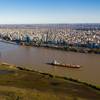A joint British Navy and U.S. Coast Guard team stopped more than 2,000 pounds of cocaine from being smuggled through the Caribbean today.
A British Navy aircraft, flying a routine patrol for Joint Interagency Task Force South, spotted a suspicious go-fast smuggling boat south of Haiti and a multi-unit pursuit ensued that was coordinated by the Coast Guard's Greater Antilles Section (GANTSEC), based in San Juan, Puerto Rico.
The HMS Manchester, A British Navy vessel with an embarked U.S. Coast Guard law enforcement detachment (LEDET), was notified of the suspect vessel and diverted to intercept it.
During the pursuit the smugglers ejected their contraband overboard and Manchester handed off the pursuit to a second British warship, HMS Wave Knight, while they recovered 42 bales of cocaine from the water.
HMS Wave Knight continued the pursuit along with a Dutch P-3 patrol aircraft, but they were unable to stop the fleeing smugglers.
This is the 18th major drug seizure in the Caribbean, Bahamas and Straits of Florida transit zone since Sept. 23. During this period, more than 28,000 pounds of cocaine and almost 8,000 pounds of marijuana have been seized by the interagency, international counter-drug team that continously patrols this region.
During fiscal year 2003 -- October 1, 2002 - September 30, 2003 -- The Coast Guard as a whole helped seize 136,865 pounds of cocaine, just missing the all time record from fiscal year 2001 in which 138,393 pounds of cocaine were prevented from infesting the streets of America. 283 smugglers were arrested as well.
Coast Guard LEDETs are routinely deployed on U.S. and foreign naval vessels throughout the Caribbean and Eastern Pacific along the primary drug transit routes. These specially trained Coast Guardsmen have the peacetime authority to enforce U.S. laws on the high seas, and by placing them on patrolling naval vessels far off our shores the Coast Guard is able to push our borders out and detect and intercept threats long before they reach the United States.
Featured videos

Tracking Foreign Vessels Working in the U.S. Jones Act Market

Inmarsat Enhances Service to Drive Digitalization

Inside the Electrified Truckable Tug
Subscribe for
Maritime Reporter E-News
Maritime Reporter E-News is the maritime industry's largest circulation and most authoritative ENews Service, delivered to your Email five times per week









